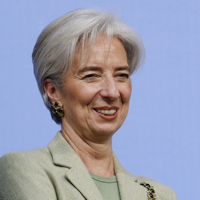The public commentary on the International Monetary Fund's search for a new managing director to replace Dominique Strauss-Kahn consistently stressed the need for a non-European to be selected in order to relegitimize the IMF. Now that French Finance Minister Christine Lagarde has been named to the job, one could understandably expect the fund to slide into irrelevance. Whether this is the case, however, depends less on the actual selection process and more on how Lagarde handles the day-to-day operations of the fund once she takes over. Maintaining some continuity with the fund's Strauss-Kahn era, while breaking with it on Greece, may hold the key to boosting the IMF's legitimacy.
The case for pessimism is based on the idea that the BRICS countries -- Brazil, Russia, India, China and South Africa -- will disengage from the IMF, having seen their hopes for a non-European managing director dashed. Nothing could be further from the truth. Brazil, Russia, India and China contributed a combined $80 billion dollars to the fund's coffers in 2009 and have a vested interest in ensuring its pre-eminence. Though the BRICS countries do not need the fund to lend to them, they do need a strong IMF that will both smooth out economic crises and ensure reforms in the developed world. Disengagement would reduce their voice in the fund's operations, jeopardizing both their markets and their investments.
Prior to the onset of the global financial crisis, the IMF looked to be an international organization without a mission. A dearth of large borrowers and ahead-of-schedule loan repayments by countries like Brazil and Argentina led to staff cutbacks and a reduction in the fund's surveillance activity. In recent years, though, the fund has rebounded impressively: It was given more resources to lend by the membership, and it made loans to middle-income countries worried about fickle capital markets. Given the origins of the crisis, it has also devoted greater attention to both bilateral and multilateral surveillance. Finally, it was designated an essential participant in the G-20 summit process, as the members tasked the fund to provide the economic analysis underpinning country assessments.

